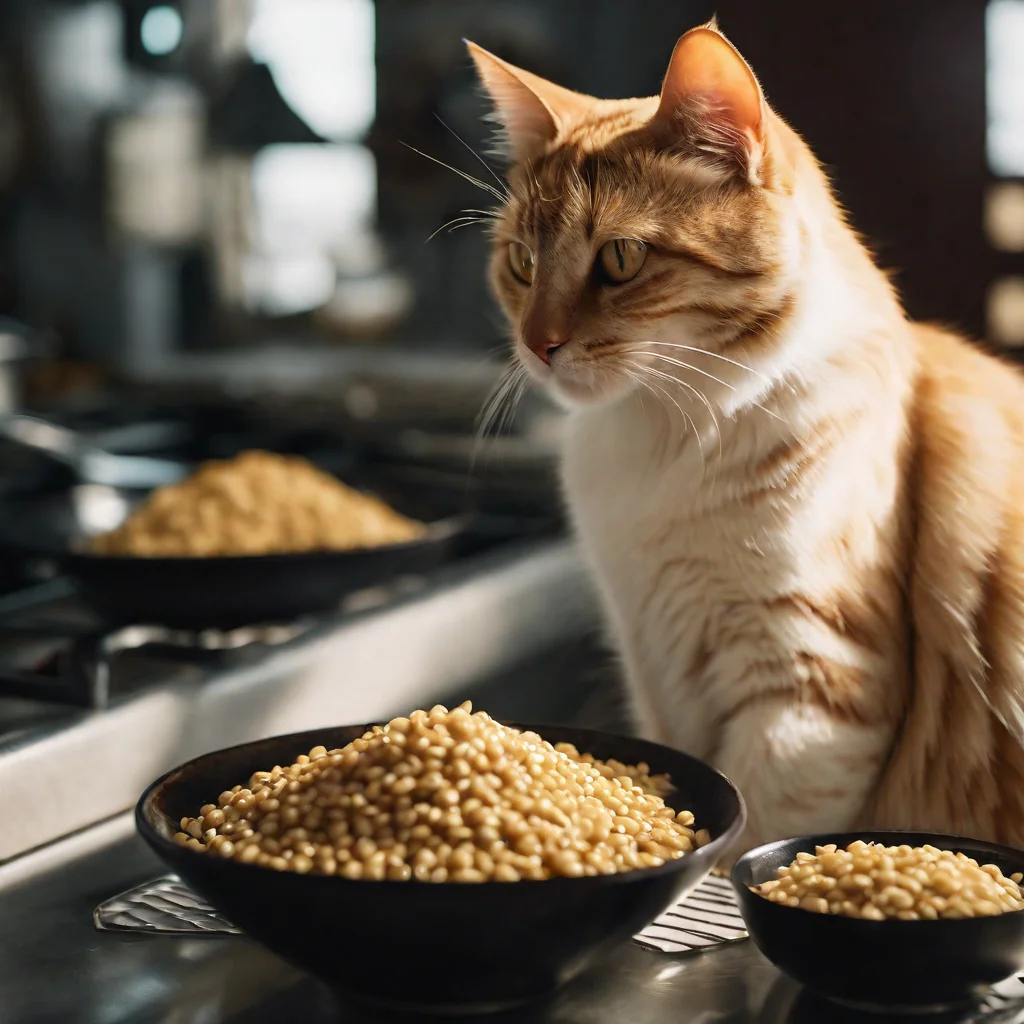Table of Contents
Introduction
As a cat owner, it’s natural to wonder about the suitability of different foods for your feline friend. Sesame oil, known for its diverse culinary uses, raises questions about its safety for cats. Let’s delve into whether sesame oil should find a place in your cat’s diet.

Understanding Sesame Oil
Sesame oil, extracted from sesame seeds, boasts a unique nutty flavor and is a staple in various cuisines worldwide. Its richness in nutrients like omega-6 fatty acids and antioxidants makes it a valuable addition to human diets.
Nutritional Value of Sesame Oil
Sesame oil contains a range of essential nutrients that can provide certain benefits to cats. These nutrients include:
Omega-6 Fatty Acids: Sesame oil is a source of omega-6 fatty acids, which are beneficial for cats. Omega-6 fatty acids play a role in maintaining healthy skin and promoting a lustrous coat. They contribute to the overall health and appearance of a cat’s fur, providing a shiny and vibrant appearance. However, it’s important to note that while omega-6 fatty acids are beneficial, cats primarily obtain these fats from animal-based sources in their diet. Therefore, sesame oil should not be relied upon as the sole or main source of omega-6 fatty acids for cats.
Antioxidants: Sesame oil also contains antioxidants, which can support a cat’s overall immune function. Antioxidants help protect the body against oxidative stress and free radicals, which can potentially damage cells and compromise the immune system. While the exact antioxidant content of sesame oil may vary, including it in a cat’s diet can contribute to the overall antioxidant intake. However, it’s important to remember that antioxidants can be obtained from a variety of sources, and a well-balanced cat food formulated with appropriate antioxidant levels is generally sufficient to meet a cat’s needs.
While sesame oil does offer certain nutritional benefits, it’s crucial to consider the overall dietary requirements of cats. Cats are obligate carnivores and have specific nutritional needs that are best met through a balanced and species-appropriate diet. While sesame oil can provide some omega-6 fatty acids and antioxidants, it should not be relied upon as a primary source of these nutrients. High-quality commercial cat food formulated specifically for cats is designed to provide the necessary balance of nutrients, including omega-6 fatty acids and antioxidants, to support their overall health.

Can Cats Safely Eat Sesame Oil?
Understanding the Unique Dietary Needs of Cats
When it comes to considering the inclusion of sesame oil in a cat’s diet, it’s essential to recognize that cats have specific dietary requirements that differ from those of humans. While sesame oil is not inherently toxic to cats, it is not a necessary component of their diet. Here’s a more detailed explanation:
Distinct Nutritional Requirements: Cats are obligate carnivores, which means their bodies are designed to thrive on a diet primarily consisting of animal-based proteins. They have specific nutritional needs that are best met through a balanced and species-appropriate feline diet. Essential nutrients such as taurine, arachidonic acid, and vitamin A are naturally found in animal tissues and are crucial for a cat’s overall health. While fats are an important part of a cat’s diet, they are typically obtained through animal fat sources rather than plant-based oils like sesame oil.
Not a Necessary Addition: Sesame oil does not provide any essential nutrients that cats cannot obtain from their regular diet. Cats can adequately meet their nutritional requirements through high-quality commercial cat food that is formulated to provide them with the necessary balance of proteins, fats, and other essential nutrients. Adding sesame oil to their diet may not offer significant benefits and can potentially introduce unnecessary risks.
It’s important to prioritize a balanced and appropriate diet for your cat, focusing on providing them with high-quality cat food that meets their specific nutritional needs. If you have any concerns about your cat’s diet or are considering introducing new foods or supplements, it’s always advisable to consult with a veterinarian. They can provide guidance tailored to your cat’s individual needs and ensure that their dietary choices promote optimal health and well-being.
In conclusion, while sesame oil is not toxic to cats, it is not a necessary addition to their diet. Cats have unique nutritional requirements that are best met through a balanced feline diet formulated specifically for their needs. By focusing on providing them with appropriate cat food, you can ensure they receive the necessary nutrients for their overall health and vitality.

Risks Associated
It’s important to understand the potential risks that can arise when introducing sesame oil to a cat’s diet. While sesame oil is generally safe for human consumption, cats have unique dietary needs and sensitivities that can make it problematic for them. One of the main risks associated with sesame oil is the potential for gastrointestinal distress. Here’s a more detailed explanation of this risk:
Gastrointestinal Distress: Cats have sensitive digestive systems, and sudden changes in their diet can lead to digestive upset. Introducing sesame oil abruptly can cause gastrointestinal distress, resulting in symptoms such as diarrhea, vomiting, or an upset stomach. This can be attributed to the cat’s inability to properly digest or tolerate the ingredients present in the oil. To minimize the risk of gastrointestinal issues, it is important to introduce new foods, including oils, gradually and in small quantities, allowing the cat’s digestive system to adapt.
Effects of Sesame Oil on Cats
When incorporating sesame oil into a cat’s diet, it’s important to be aware of the potential risks and adverse effects that may arise. These risks primarily revolve around digestive issues and allergic reactions. Here’s a more detailed explanation of these risks:
- Digestive Upset: Cats have sensitive digestive systems, and introducing sesame oil abruptly can disrupt their gastrointestinal balance. This sudden change in their diet can result in digestive issues such as diarrhea or vomiting. To prevent these problems, it’s crucial to introduce new foods gradually and monitor your cat’s response closely. This will allow their digestive system to adapt to the new addition without causing any distress.
- Allergic Reactions: Although relatively rare, some cats may have an allergic reaction to sesame oil. Just like humans, cats can develop allergies to certain substances, including oils. Allergic reactions in cats can manifest in various ways, including itching, skin irritation, or even difficulty breathing. If you notice any signs of an allergic reaction after introducing sesame oil, such as excessive scratching, redness, or respiratory distress, it’s important to discontinue its use immediately and consult with a veterinarian.

Alternatives to Sesame Oil
Given the potential risks associated with feeding cats sesame oil, it’s crucial to consider alternative options that can offer similar benefits without compromising their health. Fortunately, there are several safer alternatives available to fulfill your cat’s nutritional needs. Here are a few alternatives to consider:
- Fish Oil: Fish oil is widely recognized for its high content of omega-3 fatty acids, which are essential for promoting a cat’s skin health, coat condition, and overall well-being. Omega-3 fatty acids also possess anti-inflammatory properties, making fish oil a valuable supplement for cats with joint or inflammatory conditions. It’s important to choose a fish oil specifically formulated for cats and follow the recommended dosage to ensure optimal results.
- Feline Supplements: There are specialized feline supplements available in the market that are tailored to meet the unique nutritional requirements of cats. These supplements often contain a blend of essential vitamins, minerals, and other beneficial ingredients to support your cat’s overall health. Before introducing any feline supplements, it’s crucial to consult with your veterinarian to ensure they are appropriate for your cat’s specific needs and that they do not interfere with any existing health conditions or medications.
- Coconut Oil: Another alternative worth considering is coconut oil. Although it’s essential to use coconut oil sparingly and in moderation, it can provide certain benefits to cats. Coconut oil contains medium-chain triglycerides (MCTs), which can support a cat’s immune system and promote healthy skin and coat. However, it’s important to note that not all cats tolerate coconut oil well, so it’s advisable to introduce it gradually and monitor their response.
How to Introduce New Foods to Cats
When it comes to introducing new foods to your feline friend, a gradual transition is key to ensuring their digestive system adjusts smoothly. This process is especially important when considering the addition of oils, such as sesame oil, to their diet. Follow these steps to safely and effectively introduce new foods to your cat:
- Start Gradually: Begin by incorporating a small amount of the new food or oil into your cat’s regular diet. For instance, when introducing sesame oil, mix a tiny quantity with their usual food. This allows your cat to become accustomed to the new flavor and texture while minimizing the risk of digestive upset or adverse reactions.
- Observe for Reactions: Keep a close eye on your cat’s response to the new food. Over a few days, observe if there are any signs of discomfort, such as vomiting, diarrhea, or changes in appetite. If you notice any adverse reactions, discontinue the introduction of the new food and consult with your veterinarian.
- Gradually Increase the Amount: If your cat shows no signs of adverse reactions, gradually increase the amount of the new food or oil over time. This can be done by slightly increasing the proportion of the new food in their meals while reducing the amount of their regular food. Monitor their response during this transition period and ensure they continue to tolerate the new food well.
- Seek Veterinary Guidance: It’s always recommended to consult with your veterinarian before making significant dietary changes for your cat. They can offer personalized advice based on your cat’s specific needs and health conditions. Additionally, they may suggest alternative oils or foods that are more suitable for your cat’s well-being.
By following these steps and taking a gradual approach, you can help minimize the risk of digestive issues and ensure your cat adjusts comfortably to any new foods, including oils like sesame oil.
Signs of Allergic Reactions
It’s important to be vigilant and keep an eye out for potential allergic reactions in your beloved feline companion. Allergies can manifest in various ways, and being able to identify the signs is paramount in ensuring your cat’s well-being. Below are some common indicators to watch out for:
- Skin Irritation: One of the most noticeable signs of an allergic reaction in cats is skin irritation. Keep an eye out for excessive itching, redness, or the presence of rashes on your cat’s skin. Cats may scratch or lick the affected areas excessively, causing further discomfort.
- Respiratory Issues: Allergies can also affect your cat’s respiratory system. If you notice your cat experiencing difficulty breathing, wheezing, coughing, or sneezing more frequently than usual, it could be a sign of an allergic reaction. These respiratory symptoms should not be ignored, as they can indicate a severe allergic response.
- Digestive Problems: Another area where allergic reactions may manifest is in your cat’s digestive system. Vomiting and diarrhea are common symptoms of allergies in cats. Pay close attention to any sudden changes in your cat’s appetite, food intolerance, or gastrointestinal discomfort, as they could be indicative of an allergic reaction.
It’s important to note that allergic reactions can range from mild to severe, and immediate veterinary attention is crucial if your cat displays any signs of an allergic reaction. Allergies can worsen over time and may lead to more severe complications if left untreated. Your veterinarian will be able to diagnose the specific allergen causing the reaction and recommend appropriate treatment options.
Remember, as a responsible cat owner, it’s essential to be proactive in identifying and addressing any potential allergic reactions your cat may experience. By closely monitoring your cat for the signs mentioned above and seeking prompt veterinary care, you can help ensure your furry companion receives the necessary attention and treatment to alleviate their discomfort and maintain their overall health.

Conclusion
In conclusion, while sesame oil isn’t inherently toxic to cats, it’s not a recommended addition to their diet due to potential risks. Always prioritize your cat’s health by consulting a veterinarian before introducing new foods.
FAQs about Cats and Sesame Oil
- Can cats have sesame oil for hairballs?
No, sesame oil isn’t a recommended solution for hairballs in cats. Consult a vet for suitable remedies.
- Is it safe to apply sesame oil topically on cats?
Avoid applying sesame oil topically on cats as it might lead to skin irritation or allergic reactions.
- Will sesame oil benefit a cat’s coat?
Cats generally get necessary oils from their diet; therefore, sesame oil isn’t necessary for their coat health.
- How much sesame oil can a cat consume safely?
There isn’t a safe recommended dosage for cats. It’s best to avoid giving them sesame oil.
- What should I do if my cat accidentally ingests sesame oil?
Contact your veterinarian immediately if your cat consumes sesame oil unintentionally.
Remember, your cat’s well-being is paramount. Always consult a professional before introducing new foods to your feline companion.
Related Reads:


Can cats eat coconut? A surprising answer! Pawsgal
[…] Can Cats Eat Sesame Oil? A Comprehensive Guide […]
Cracking Open a Can of Tuna for Your Cat: Should You or Shouldn't You? Pawsgal
[…] Can Cats Eat Sesame Oil? A Comprehensive Guide […]
Why Is My Dog Standing Still And Not Moving? Pawsgal
[…] Can Cats Eat Sesame Oil? A Comprehensive Guide […]
Water with an Added Boost: Can My Dog Drink Vitamin Water? Pawsgal
[…] Can Cats Eat Sesame Oil? A Comprehensive Guide […]
Can Cats Have Coconut Water? A complete Guide - Pawsgal
[…] Can Cats Eat Sesame Oil? A Comprehensive Guide […]